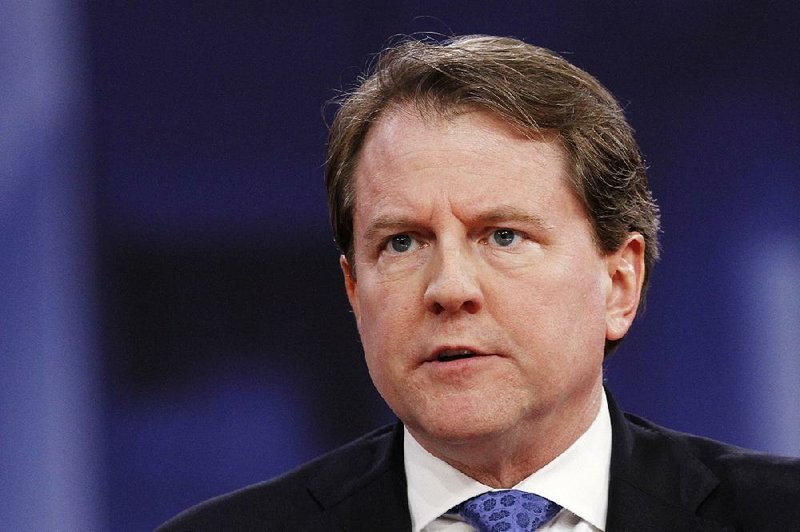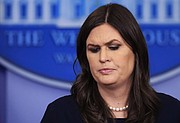WASHINGTON -- President Donald Trump on Friday denounced accounts by White House insiders in special counsel Robert Mueller's report that Trump said were designed to make him look bad.
Trump struck a defiant tone Friday, using an obscenity in tweets to dispute claims in the report by former administration officials that he tried numerous times to stop or influence the probe.
"Statements are made about me by certain people in the Crazy Mueller Report, in itself written by 18 Angry Democrat Trump Haters, which are fabricated & totally untrue," Trump wrote.
"Because I never agreed to testify, it was not necessary for me to respond to statements made in the 'Report' about me, some of which are total bulls**t & only given to make the other person look good (or me to look bad)," he added.
The Arkansas Democrat-Gazette chose to insert asterisks rather than quote the president directly.
Mueller tried to get the president to sit for an interview for more than a year, but Trump's attorneys resisted.
While the president, according to people close to him, did feel vindicated by the report, he also felt betrayed by those who had painted him in an unflattering light.
Mueller found no criminal evidence that Trump or his campaign aides colluded in Russian election meddling and did not recommend obstruction charges against the president. The 448-page report released Thursday nonetheless paints a damaging picture of the president, describing numerous cases where he discouraged witnesses from cooperating with prosecutors and prodded aides to mislead the public on his behalf to hamper the Russia probe he feared would cripple his presidency.
The accounts prompted Republican Sen. Mitt Romney of Utah, who has sometimes clashed with Trump, to release a statement saying he was "sickened at the extent and pervasiveness of dishonesty and misdirection by individuals in the highest office of the land, including the President."
"Reading the report is a sobering revelation of how far we have strayed from the aspirations and principles of the founders," he said.
The report concluded that one reason Trump managed to stay out of trouble was that his "efforts to influence the investigation were mostly unsuccessful ... largely because the persons who surrounded the President declined to carry out orders or accede to his requests."
Trump appeared to be especially angry with former White House counsel Donald McGahn, who sat with Mueller for about 30 hours of interviews and is referred to numerous times in the report.
In one case, Mueller recounts how Trump called McGahn twice at home and directed him to set in motion Mueller's firing. McGahn recoiled, packed up his office and threatened to resign, fearing the move would trigger a potential crisis akin to the Saturday Night Massacre of firings during the Watergate era.
The report also says McGahn refused to release a statement repudiating a New York Times story that Trump had asked McGahn to have Mueller fired. The reason, according to McGahn, was that the story was accurate.
In another section, Mueller details how Trump questioned McGahn's note-taking, telling the White House counsel that, "Lawyers don't take notes" and that he'd "never had a lawyer who took notes."
McGahn responded that "real lawyers" do.
"Watch out for people that take so-called 'notes,' when the notes never existed until needed," Trump said in one of his tweets Friday. Others whose notes were referred to in the report include former staff secretary Rob Porter and Reince Priebus, Trump's first chief of staff.
Trump lawyer Rudy Giuliani, appearing on Fox and Friends, said the reference to note-taking could also be about former FBI Director James Comey. Giuliani also said that given the level of detail in the report, it's not possible that "some of it isn't wrong."
"They don't give you the other side of it," he said.
In his tweets Friday, Trump called the probe a "big, fat, waste of time, energy and money," adding that "It is now finally time to turn the tables and bring justice to some very sick and dangerous people who have committed very serious crimes, perhaps even Spying or Treason."
Ari Fleischer, who served as White House press secretary to former President George W. Bush, said in an appearance on Fox News that he didn't understand why Trump decided to send his tweets lashing out at former aides.
"I think it's over," he said. "If I were the president, I would have basically declared victory with the Mueller report and everything that came out and move beyond it."
Still, he said he hoped the White House had learned some lessons.
"The president and his entire team needs to realize how close they came to being charged with obstruction," Fleischer said. "Asking your staff to lie and engaging in some of the activities that the Mueller report stated the president engaged in is too close to obstruction. And that's a lesson I hope everybody at the White House takes with them going forward."
'SLIP OF THE TONGUE'
Meanwhile, White House press secretary Sarah Huckabee Sanders tried to do damage control on her credibility Friday, insisting that she hadn't intentionally misled the American public about Comey's firing despite telling the special counsel that her claim that "countless" agents had lost confidence in him was not founded on anything.
Sanders, who told Mueller that her comment during a White House press briefing in May 2017 had been a "slip of the tongue" made in the "heat of the moment," claimed in a series of television interviews that the sentiment behind her words -- that many rank-and-file FBI agents had lost confidence in Comey and contacted the White House to say so -- remained true.
"If you look at what I said, I said the 'slip of the tongue' was in using the word 'countless,' but there were a number of FBI, both former and current, that agreed with the president's decision, and they've continued to speak out and say that and send notice to the White House of that agreement with the president's decision," she said on ABC's Good Morning America.
"I said that it was in the heat of the moment, meaning it wasn't a scripted thing," she added on CBS This Morning. "But the big takeaway here is that the sentiment is 100% accurate."
A section of the report that refers to Comey's firing by Trump notes Sanders telling reporters that the White House had heard from "countless" FBI agents who had lost confidence in Comey's ability to lead the bureau. She dug in when a reporter pushed back, asking, "I mean, really?"
"Between like email, text messages, absolutely," she responded, claiming that there had been at least 50 contacts.
But Mueller's report found that the "evidence does not support those claims."
"The President told Comey at their January 27 dinner that 'the people of the FBI really like [him],' no evidence suggests that the President heard otherwise before deciding to terminate Comey, and Sanders acknowledged to investigators that her comments were not founded on anything," the report said.
Sanders, who spoke to Mueller's investigators under oath, told them her use of the word "countless" was a "slip of the tongue."
"I'm sorry that I wasn't a robot like the Democrat Party that went out for 2½ years and stated time and time again that there was definitely Russian collusion between the president and his campaign, that they had evidence to show it and that the president and his team deserved to be in jail, that he shouldn't be in office when, really, they were the ones that were creating the greatest scandal in the history of our country," Sanders said on ABC.
At least one publisher said Mueller's report worsened Sanders' credibility.
"This now documented, on-the-record, under-oath episode, I think it completely obliterates her credibility," said Kyle Pope, editor-in-chief and publisher of Columbia Journalism Review. "I remember watching and thinking there is no way countless FBI people called up Sarah Sanders. It stretched credulity just on its face."
Pope said the episodes raise questions about why any reporter would attend Sanders' briefings, which she has scaled back from daily to about monthly, or "put stock" in what she says.
Information for this article was contributed by Jill Colvin, Deb Riechmann, Kevin Freking and Darlene Superville of The Associated Press; and by Colby Itkowitz and John Wagner of The Washington Post.
A Section on 04/20/2019

